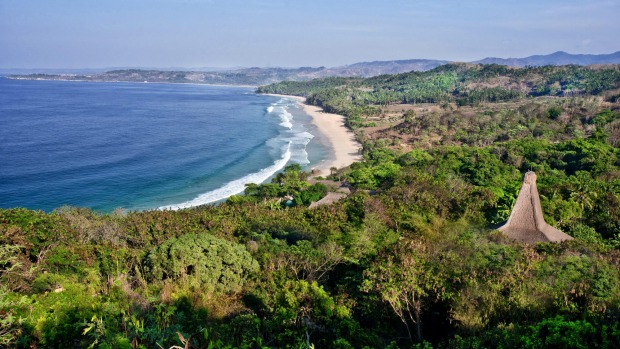
For most of its history, Nihiwatu has flown under the radar. Every now and again, the name would crop up when travellers of a certain ilk got together. Surfers knew about it. The wave that is Nihiwatu's raison d'etre saw to that. The best left-hand break in Indonesia was the word.
But not everyone who made it to Nihiwatu on the island of Sumba was a surfer. Well-heeled Australian families, European royalty, nature lovers and the odd American cultural icon were all part of the guest mix. What this motley crew had in common was the determination to get there and, to be frank, the wherewithal to make it a reality.
From whatever corner of the globe you are coming, Sumba is a long haul. It's one of the Lesser Sunda group of islands, about 400 kilometres east of Bali. Regular flights from Denpasar are a recent occurrence and then it's 90 minutes of hard driving to the remote south-west coast.
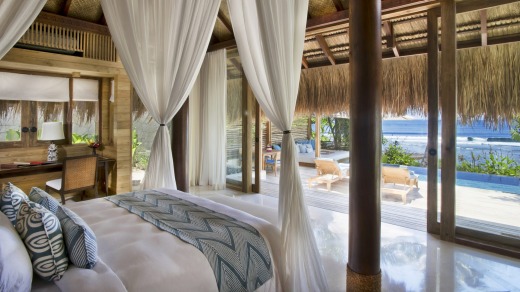
But as soon as you arrive at the cliff-top entrance, you get what all the fuss is about. Edge of wildness is the sign that welcomes visitors; surrounded by wildness is more like it. Out front, that legendary wave rolls in. Look down, and a tangle of trees, vines and palms is broken only by tall thatched roofs. To the right, a wide, white sandy beach stretches around the coast. To the left, patches of blue merge where the Indian Ocean meets the horizon.
That's all, folks. That's Nihiwatu.
Nihiwatu's back story is the stuff of Hollywood movies. American surfer scours the planet for four years, searching for the perfect surf break. He finds his wave off Sumba's isolated south-west coast in 1988.
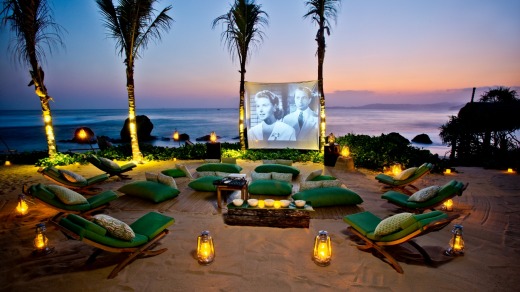
There, he encounters the fiercely traditional, territorial and tribal Sumbanese, one of the last thriving megalithic cultures, a people whose lives are guided by the animistic Marapu religion and its ancient blood-spilling rites and intricate burial rituals. Officially, headhunting was banned in the 1950s. Unofficially? Rumours abound.
None of which deters the surfer Claude Graves and his wife, Petra, who pitch their tent on the beach between the wave and jungle and set about building a resort that will appeal to others who love the finer things in life, like perfect waves, a simple lifestyle and an ancient and mysterious culture.
Graves also secured the rights to the wave and limited the number of surfers to 10 a day, an act that won him no fans among the wider surfing community, but assured Nihiwatu's exclusive status.
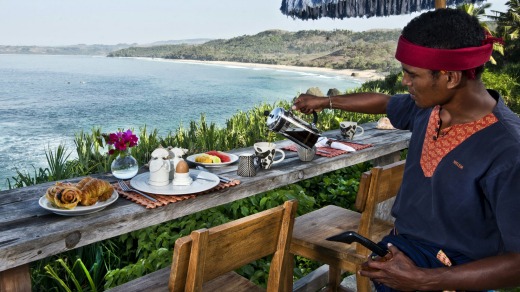
And so they came. First, the surfers to check whether the wave was all that it was cracked up to be. It was. God's wave, they dubbed it. Others preferred the moniker Occy's Left, homage to Australian world surfing champion Mark Occhilupo's mastery over the Nihiwatu tubes.
Then came people whose names are their fortune – Hermes and Rockefeller, for instance – seduced into recidivism by the location, luxe comforts and the camaraderie of the surfing culture. But it was the people who kept Graves anchored to the spot, and guests who could afford to go anywhere returning.
The Sumbanese are among the poorest people of Indonesia. Most of the 600,000-strong population live in remote villages untouched by modernity. Jann Wenner, the co-founder of Rolling Stone magazine and a Nihiwatu devotee, describes Sumba as a world that time has left behind. "What I witnessed in the amazing ancestral villages of West Sumba has left a lasting impression on me," he has said.
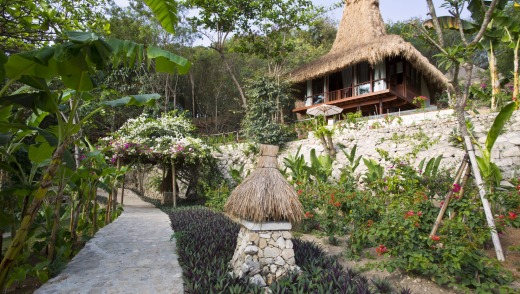
Less than 30 minutes into the journey from the airport to Nihiwatu, my driver, Marthen, indicates a crowd on the side of the road. "There's a buffalo being slaughtered there if you look now," he says. I do and he is right. When he points out another group a short time afterwards – this time it is a pig – I keep my eyes fixed on the road.
The sacrificing of animals is one element of Sumba's complex funeral rites; massive sarcophagi outside the homes we pass are another. Successive Indonesian governments have tried to convince the Sumbanese to abandon their traditional ways with limited success. Wives and servants are no longer sacrificed and while the pasola, a wild and bloody ritual that involves armies of horsemen charging at each other, is still held annually, these days the horsemen's spears are blunt.
You could be forgiven for thinking, as I did when I heard that an American billionaire had bought Nihiwatu: well, there goes the 'hood. Billionaires used to dealing in stratospheric numbers are not a natural fit with eco-hideaways in fragile landscapes. But buying Nihiwatu was not a business decision for Chris Burch, the co-founder of the Tory Burch fashion and retail empire. Like so many others, Burch fell in love with the place and the people of Sumba.
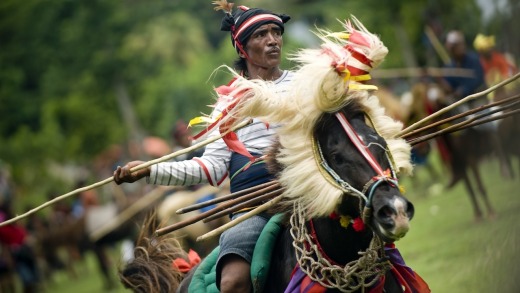
"Very rarely does something so profoundly touch you that you need to be part of it, " he has said.
While there have been substantial changes and additions to the 230-hectare property under Burch and his business partner, international hotelier James McBride, Nihiwatu remains an ode to both the people of Sumba and the glory of God's wave.
Significantly, Burch is donating all profits to the Sumba Foundation, which was set up and is still run by Graves to improve the lives of the Sumbanese.
Every aspect of the resort's rejuvenation – from the layout, design and building materials to the food, uniforms and activities – references Sumbanese culture. The resort's 32 villas are built from local timbers and grasses and are configured like Sumba's villages (although swimming pools take the place of the sarcophagi). Interiors pick up the colour palette and patterns of the ikats or woven cloths for which the Sumbanese are famed. More than 90 per cent of the 250-strong staff come from surrounding villages, and are dressed in traditional garb, machete at the waist. The produce is sourced locally – Nihiwatu has its own organic gardens and has nurtured partnerships with local producers – and the menus are proudly Sumbanese and Indonesian, with a nod to Western tastes.
Nihiwatu is not the place for people who equate glitz with glamour or want to prance around in heels. You can't anyway; there's sand everywhere – on the pathways that weave in and around trees and palms, surrounding the villas and in the communal spaces. The spectacular Ombak restaurant and bar, cantilevered over the ocean with an all-encompassing view of that famous wave, has sand on the floors and a thatched roof, but it is still the most effortlessly glamorous place I have seen.
Life can be as social or as solitary as you want at Nihiwatu. Most nights, guests congregate to watch the sun set at either Ombak or at the Boat House, the aquatic sports hub, and there can be no more spectacular way to finish a day than watching God's Wave roll in, a G'n'T in one hand, lime-drenched sashimi carved from fish that day in the other. With a bit of luck, Graves, who still lives on the property, will be around and up for a chat about the latest developments of the foundation.
But if you are craving solitude, that's easily sorted, too. Hammocks and day beds are tucked away in pandanus nooks and beach shacks for massages. Nihiwatu's private beach was deserted during my stay, save for wandering buffalos and the occasional bunch of local kids splashing about in the shallows.
Surprisingly for a place that sounds so sophisticated on paper, Nihiwatu is a kid-friendly zone. The set-up of the multi-villa enclaves makes them perfect for extended families, while the communal Menara Bale has table tennis and pool tables, games and books.
You don't have to be a surfer to fall madly, deeply in love with Nihiwatu. I did and the closest I got to the wave was paddle boarding down the end of Nihiwatu's private bay, which was as far away from the swell as I could get.
Still, most days most of the 10 surf spots on the wave are filled for most of the day. The resort's team of watermen, headed by American big-wave surfer Mark Healey, are always on hand to supervise and coach if needed.
The activities and extras on offer at Nihiwatu – horse riding, nature treks into the hinterland, reef diving, deep-sea fishing and, most particularly, visiting the local villages are about acquainting guests with Sumba. It's a good fit. Sumba is known as the cowboy island and horseracing is popular with locals.
Everyone inside Nihiwatu is keen that I get out and visit a village. "Then, you will really understand," I'm told.
They are right. Waihola, a cluster of 20 or so houses surrounded by boulders, rubbish and piles of wood, is extremely confronting.
To my Western eye, the only beauty is in the people who greet us shyly, but are eager to show us their prized possessions: mosquito nets supplied by the Sumba Foundation, a flimsy but effective barrier between life and death from malaria.
Nihiwatu, as a resort, delivers the holiday of a lifetime, but with Nihiwatu comes an introduction to Sumba and its people, and that is truly unforgettable, perhaps even life-changing, as Jann Wenner said.
The Sumba Foundation, which was established by Graves in 2001 and is funded by donations from Nihiwatu's guests, provides aid for water, health, education and economic projects. The goal, as defined by Graves, is to improve the lives of the Sumbanese, while preserving their culture and traditions.
More than 20,000 people have been treated by five health clinics built and staffed by the foundation; malaria rates in the area have been reduced by 85 per cent; more than 60 water wells and 240 water stations have been developed; and 16 primary schools have been provided with water, toilets, books and supplies. The foundation also provides scholarships for students to attend nursing and trade schools, with the best students offered employment with Nihiwatu Resort and the foundation.
See www.sumbafoundation.org.
The Department of Foreign Affairs and Trade advises all travellers to Indonesia to exercise a high degree of caution, due to the high threat of terrorist attack.
www.smartraveller.gov.au .
www.nihiwatu.com .
Garuda International Airport operates daily flights from Melbourne and Sydney to Denpasar. It has daily one-hour connections between Denpasar to Sumba's Tambolaka airport from about $50 one-way. Both Australian flights arrive after the Sumba flight's departure time, necessitating an overnight stay on Bali.
www.garuda-indonesia.com
www.indonesia.embassy.gov.au
A one-bedroom villa is $US1089 (1352) a night in the shoulder season, $US1331 ($1652) in the high season and $US787 ($977) in the green season, including all meals, non-alcoholic drinks, daily laundry, scheduled excursions and activities, and Wi-Fi. Prices include government taxes and service charges.
High season: June 15 to October 10 and December 21 to January 8. Five-night minimum stay required.
Shoulder season: October 11 to November 14 and March 21 to 31. Three-night minimum stay.
Green season: November 15 to December 20 and January 9 to March 20.
There is a stay five nights and pay for four nights deal available from September 15 until November 14 that includes all of the above. Bookings must be made by July 31.